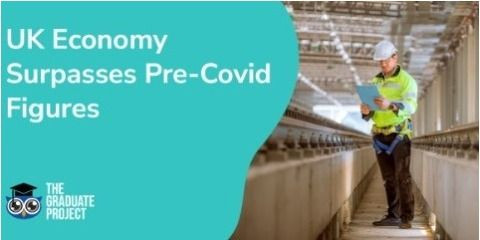Search Vacancies
Blog
UK Economy Surpasses Pre-Covid Figures
- January 17, 2022

Figures that have been collected for November 2021 shows that the UK economy was actually at a higher rate than they were pre-Covid19! This was found after recordings for the month came back as stronger than expected.
According to statistics by the Office for National Statistics (ONS) there has been a rise in gross domestic product of 0.9% between October and November 2021 alone. This came as a surprise considering economists had predicted a much smaller growth, not the 0.7% increase from February 2020 that has actually happened!
This is likely the result of Britain’s businesses being in a state of near pre-Covid normality again after the government decided to no longer have restrictions in place across the country, therefore prompting shoppers to go out and experience life as they would have once known it to be.
The rise in figures could also be as a result of certain work sectors being able to get back to normal. This was seen particularly with those working in construction - they recovered from months of weak income and work since raw materials were becoming easier to gain access to and the dry weather was optimal for this type of work. This sector actually helped to boost the economy by 3.5%!
These statistics, however, are not completely current since they are from 3 months ago. This was before the news of Omicron spread rapidly across the country and the UK government introduced Plan B measures wherein people were encouraged to stay home unless it was a necessary trip.
The chief UK economist at Pantheon Macroeconomics, Samuel Tombs, actually claimed that the UK’s gross domestic product ‘almost certainly dropped in December, as households hunkered down in response to the Omicron variant.’ He explained how these sorts of predictions were as a result of looking at consumer services expenditure across restaurants, transport and cinemas, and noting how people had refrained from these more leisurely activities.
Though the good news with Omicron is that its effects on the economy should not last too long as with the results of Plan B as well as the rollout of booster jabs this variant’s cases are no longer spreading at quite such a rapid pace. Also the rules and suggestions that were promoted by the government are set to no longer be in place by 26 January- so, more people will be out spending again.
The recession that the UK faced as a result of the Coronavirus pandemic was the most debilitating hit to our economy that has been seen in over 300 years! With both businesses and employment being the most hurt and resulted in the Government having to borrow loans of hundreds of billions from around the world to support the economy.
It is predicted that the first few months of 2022 will not have as big an impact on the economy as what has been seen in the last few months of 2021. This is due to the festive, gift giving season being over as well as the novelty of the freedom to go out and spend your money again with fewer regulations has worn off.
Inflation is also expected to see an increase of 6% by the spring of 2022, with certain banks having raised their interest rates in December and increasing their borrowing costs for the population.
Rishi Sunak attributes this impressive economic bounce back to the ‘testament’, ‘grit’ and ‘determination’ of the British public.
It is hoped that the enormous growth that the country’s GDP experienced in November will not be so awfully hit by Omicron that we will struggle to get back to the November figures.
